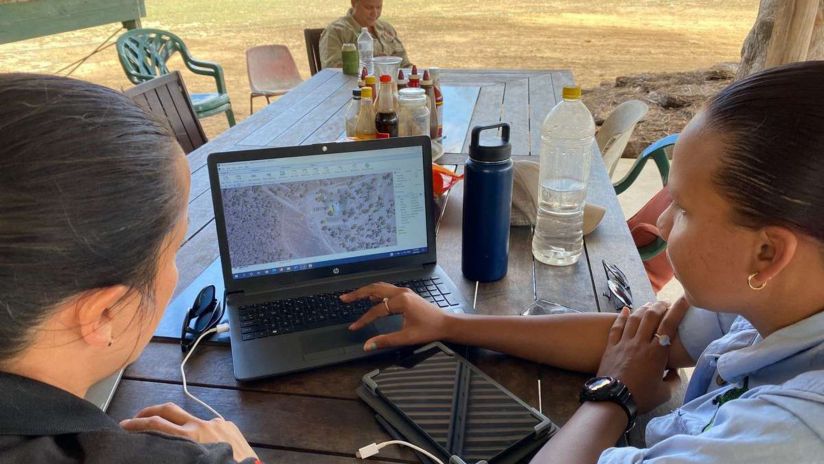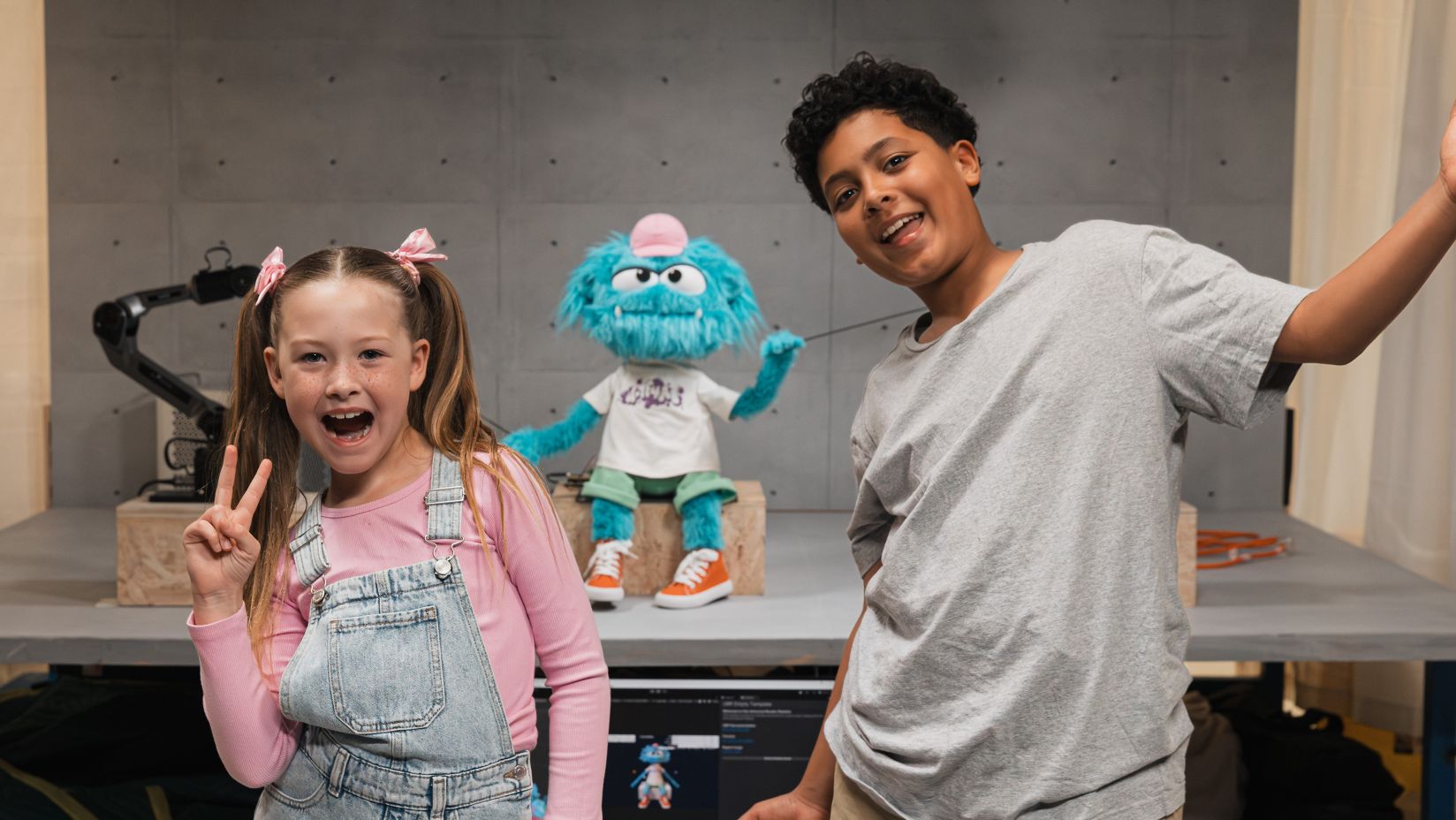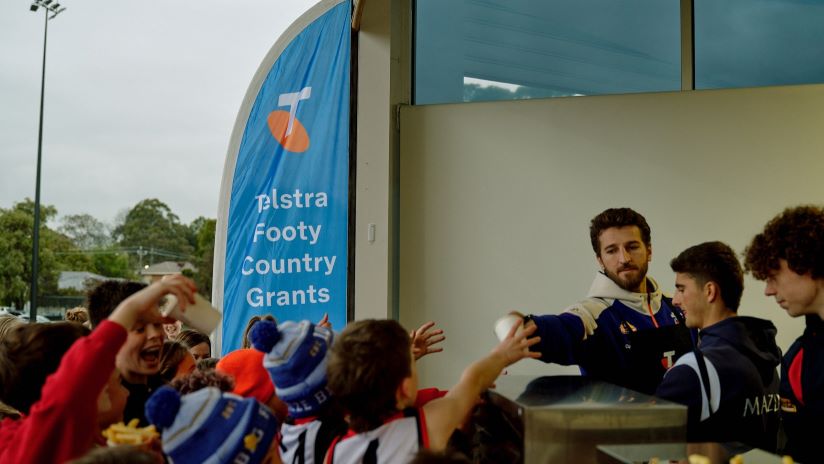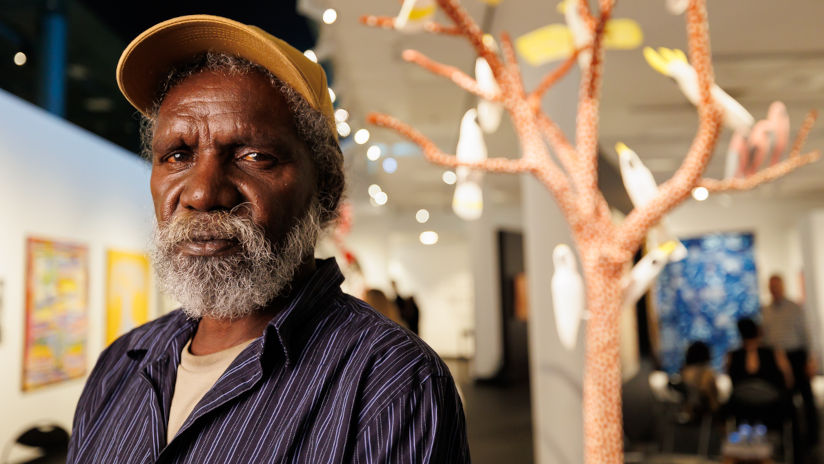Backing First Nations-led approaches to AI tech for healthy country
Telstra Foundation’s Jackie Coates talked to Ricky Archer, CEO of the North Australian Indigenous Land and Sea Management Alliance (NAILSMA), and Lauren Ganley, Telstra’s Head of First Nations Strategy and Engagement, about the Healthy Country AI training initiative – a new partnership to bring leading edge technology to the bush. Telstra Foundation has contributed $1.7 million to the initiative.

Image: Bininj Traditional Owner ladies in Kakadu National Park using an interactive data dashboard to explore changes coverage of weeds after management
Jackie Coates: This new NAILSMA collaboration has been described as a “coalition of the willing”, can you share some more about this $2.6 million partnership?
Ricky Archer: The Healthy Country AI Training Initiative brings together NAILSMA and CSIRO, in collaboration with Telstra Foundation, Microsoft, the Australian Government’s National Environmental Science Program (NESP) Resilient Landscapes Hub and the Women in STEM and Entrepreneurship program.
NAILSMA, as the project lead, is working with Indigenous groups in Kakadu, Arnhem Land and Cape York and Australia’s national science agency CSIRO to co-design the program. It will train Indigenous rangers to use AI driven software, drones, and other digital technologies to monitor and adaptively manage their Country.
So while this is a coalition of different partners bringing their own unique offer to the table, what’s really pleasing is we’re all committed to First Nations-led and co-designed programs and we all want to see effective local models scaled nationally.
Jackie Coates: What are you hearing from local land and sea managers about using tech in their work?
Ricky Archer: I think it’s often overlooked that Indigenous-titled lands cover about four million square kilometres of traditional land and sea – over half of our land mass. That’s a lot of Country to look after and those that do this work are also facing into complex social and environmental challenges.
Our traditional lands are threatened by increasing levels of feral animals and invasive weeds, changing climate, mismanagement of Cultural and Natural resources, and pollution of waterways and oceans – so no shortage of challenges. So there’s definitely an appetite to explore new tools, new partnerships, and new approaches to drive solutions at scale.
The rangers have shared some great opportunities already where they’d like to use technology to help tackle these challenges in their work. For example, in Cape York, feral pigs are threatening the sea turtle population by eating their eggs. The Kalan rangers want to better monitor and track activity in the area to help manage the problem. Similarly, in Kakadu the Bininj rangers want to explore how tech could help them manage the para grass which is an invasive weed affecting the magpie geese’ native habitat.
They’ve also shared they are keen for digital skills training that is grounded in traditional knowledge to better support effective decision-making on Country.
We plan to roll-out the program steadily over the next two years in Northern Australia and we’ll review our progress as we go. The idea is to create a model for Aboriginal and Torres Strait Islander rangers across the country to adopt, taking local programs to a national scale. We see this model as living framework, a system that can be adapted and improved to suit the needs of Traditional Owners and Indigenous land & sea management practitioners.
Jackie Coates: Lauren, you’re developing Telstra’s new First Nations strategy. How does the Healthy Country AI project align to this work?
Lauren Ganley: Improving digital inclusion and environmental action are two pillars of Telstra’s Responsible Business strategy which we’ve incorporated in much of Telstra’s First Nations work.
What I love about this program, is that it addresses both, with a First Nations’ lens: supporting First Nations peoples to learn new digital skills but also supporting the rangers to apply their digital skills to enhance land and sea management in the face of some pretty complex on Country challenges.
Jackie Coates: What do you think will make this digital skills programs successful?
Lauren Ganley: The strength of this program is that it is First Nations led and co-designed with First Nations communities.
NAILSMA has strong local relationships and deep experience in empowering rangers with technology and best-practice approaches for land and sea management. In addition, the traditional knowledge of the five communities NAILSMA is working closely with will be embedded in the digital tools.
By design, it will reach beyond just environmental benefits – as it’s thinking through cultural and economic benefits for local communities and land management.
Jackie Coates: Ricky, if you were to sum up the vision for this program, what would it be?
Ricky Archer: This is a story about connection – connecting First Nations traditional wisdom with customised 21st century tech. We know tech enabled land management, in the hands of Aboriginal and Torres Strait Islander peoples, has the potential to not only enhance land and sea management across this country but also livelihoods.
Both NAILSMA & CSIRO will coordinate the on-ground digital training for the healthy Country monitoring program, which will be co-designed to suit local contexts and empower Indigenous rangers to build critical digital skills for future work on Country. For more information about Healthy Country AI Training initiative, visit Healthy Country AI.


